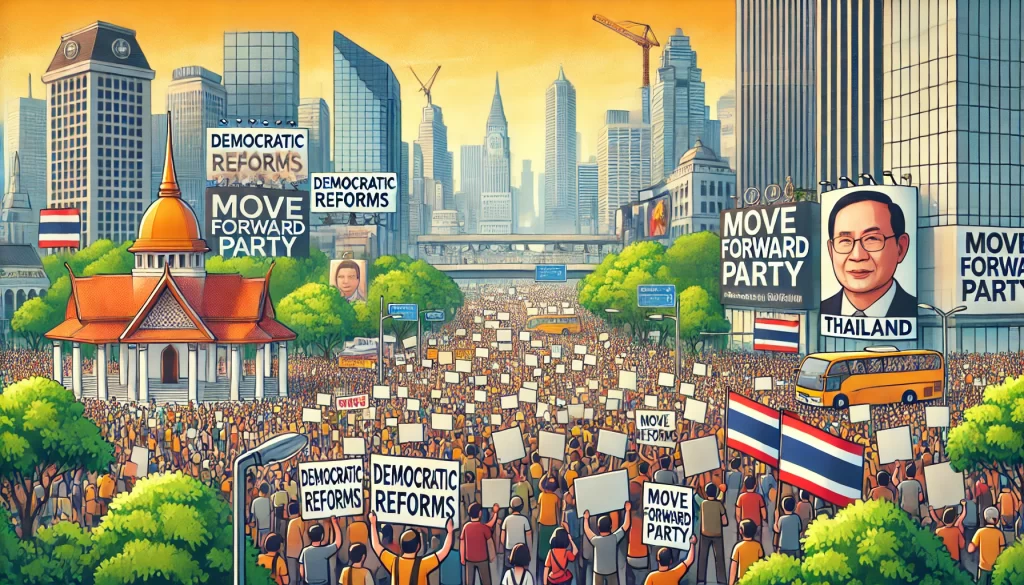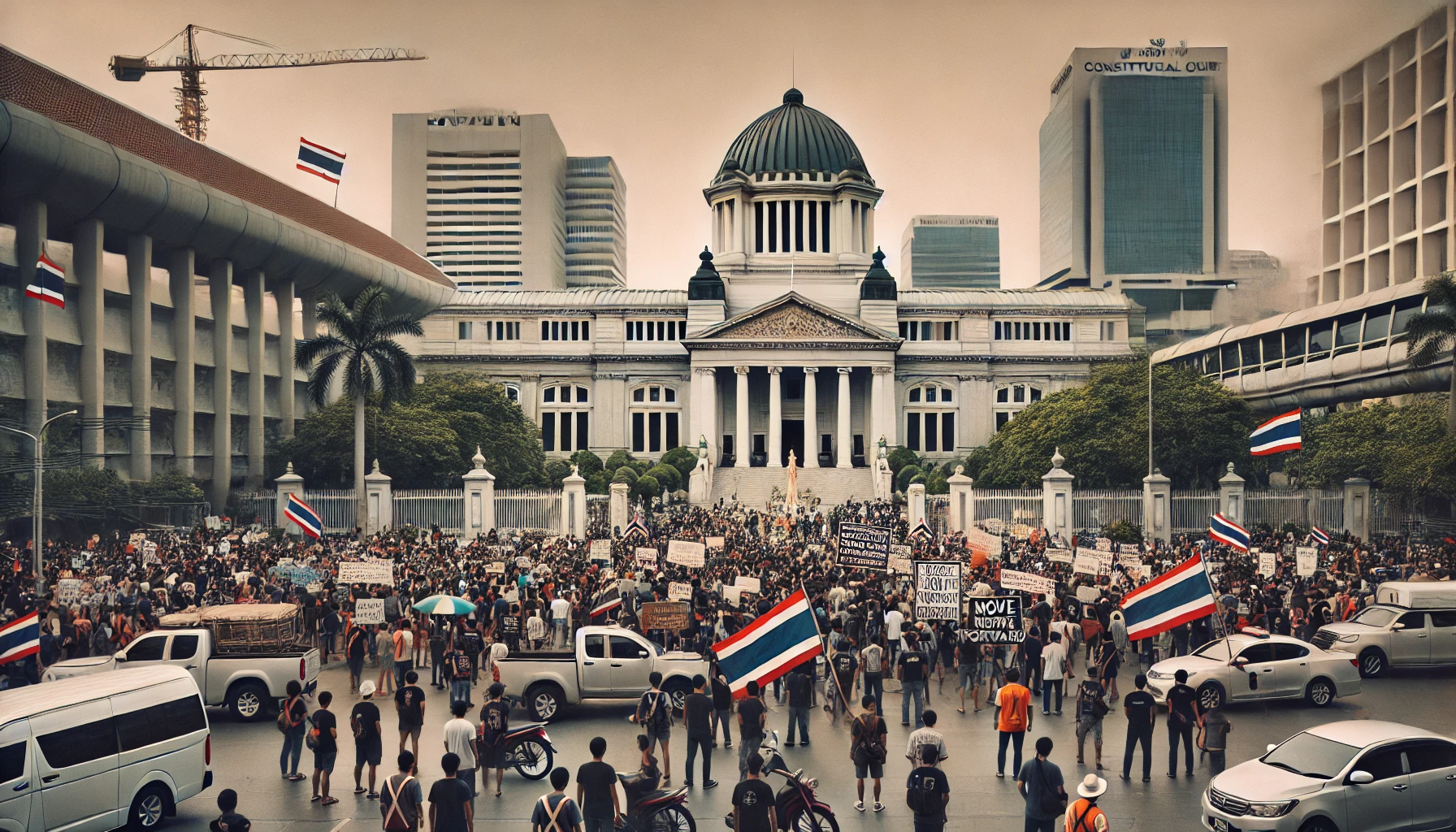On August 7, 2024, Thailand’s Constitutional Court ordered the dissolution of the Move Forward Party (MFP), one of the country’s most popular political parties. The court ruled that MFP violated the constitution by proposing to amend the lèse-majesté law, which forbids criticism of the royal family. This decision also bans the party’s leaders from participating in politics for ten years.
The lèse-majesté law, known as Article 112, is a controversial law that can result in up to 15 years of imprisonment for anyone who defames, insults, or threatens the king, queen, heir-apparent, or regent. MFP’s proposed changes aimed to reduce the harsh penalties and prevent the law from being used to silence political opponents.
MFP, led by Pita Limjaroenrat, won the most votes in the 2023 general election, appealing particularly to young and urban voters with its promises of political reform. The party’s platform included plans to demilitarize the government, reduce monopolies, and decentralize power, all intended to strengthen democracy in Thailand. However, Pita’s bid to become prime minister was blocked by conservative forces in the Senate, and the party faced multiple legal challenges.
The court’s decision to dissolve MFP has sparked reactions from various groups. Pita addressed his supporters, urging them to stay hopeful and determined. “I understand that you might feel disappointment, angry, resentful, or you might have tears. I won’t blame you. Today, for one day, let us be sad and angry as much as needed,” he said. “Tomorrow we will draw a line in front of us, and we will walk across it. We will take the resentment, anger, the energy that exists now, we will not let it consume us. We will push it and let it explode in every voting booth.”

MFP plans to regroup and form a new party, continuing their efforts for political change. The party’s leaders and many of its supporters believe that the dissolution was politically motivated, aimed at maintaining the power of the conservative, royalist establishment.
Human rights organizations like Amnesty International and the Asian Forum for Human Rights and Development have condemned the court’s ruling, calling it a misuse of laws to stifle political opposition. Critics argue that Thailand’s political system remains heavily influenced by conservative and military interests, which often use legal means to suppress democratic movements.
The dissolution of MFP follows a pattern in Thai politics, where popular parties have been disbanded by court rulings. In 2020, the Future Forward Party, MFP’s predecessor, was also dissolved under similar circumstances, leading to widespread protests and calls for democratic reforms.
Despite the challenges, MFP’s leaders remain committed to their cause. Pita Limjaroenrat expressed optimism for the future, stating, “Oh, we’re going to try again. So, in the worst-case scenario, if we’re going to be kneecapped again the next 10 people, you know, will take over … So if it doesn’t work this time, it will work next time.”
As Thailand navigates this political upheaval, the future of its democracy and the role of its monarchy remain contentious issues, with many citizens advocating for significant reforms.
This article is based on the following articles:

Background Information
Thailand’s Political System
Government Structure: Thailand is a constitutional monarchy, which means that it has a king or queen whose powers are limited by a constitution. The country also has a parliament and a prime minister who runs the government. The king is highly respected, and his role is mostly ceremonial.
Constitutional Monarchy: In a constitutional monarchy like Thailand, the monarch’s powers are defined and limited by a constitution. The king or queen’s duties are largely symbolic, and the real political power is held by elected officials and institutions.
Parliament and Elections: Thailand’s parliament consists of two houses: the House of Representatives and the Senate. The House of Representatives is made up of members elected by the people, while the Senate includes members who are appointed, not elected. The prime minister, who is the head of government, is usually the leader of the party that wins the most seats in the House of Representatives.
Military Influence: The Thai military has a significant influence on the country’s politics. There have been several military coups in Thailand’s history, where the military has taken control of the government. The military often supports conservative and royalist elements in Thai politics.
The Lese-Majeste Law
Definition and Purpose: The lese-majeste law, known as Article 112 in Thailand’s criminal code, makes it illegal to defame, insult, or threaten the king, queen, heir-apparent, or regent. The law is intended to protect the royal family from criticism and maintain their high status in Thai society.
Penalties: Violating the lese-majeste law can result in severe penalties, including up to 15 years in prison for each offense. This makes it one of the strictest such laws in the world.
Criticism and Controversy: The lese-majeste law is controversial because it is often used to silence political opponents and critics of the government. Human rights organizations argue that the law restricts freedom of speech and is used to suppress democratic movements. Many people believe the law should be reformed to prevent its misuse.
Historical Use: The law has been in place for many years, and there have been numerous cases where individuals have been prosecuted for making statements or performing acts deemed offensive to the royal family. This has included activists, politicians, and even ordinary citizens.
Recent Political History
Future Forward Party: The Future Forward Party was a progressive political party in Thailand that gained significant support, especially among young people. It was dissolved in 2020 for allegedly violating election laws. The dissolution led to large protests and the formation of the Move Forward Party as its successor.
Move Forward Party: The Move Forward Party continued the legacy of the Future Forward Party, advocating for democratic reforms and changes to the lese-majeste law. It became very popular in the 2023 general election but faced opposition from conservative and royalist forces in Thailand.
Political Activism and Protests: Over the past few years, there have been numerous protests in Thailand calling for democratic reforms and changes to the lese-majeste law. These protests have been led mainly by young people and students who want a more democratic and open society.
Key Figures
Pita Limjaroenrat: Pita is a prominent Thai politician and the leader of the Move Forward Party. He is known for his charismatic leadership and his advocacy for political reforms. He was blocked from becoming prime minister despite his party’s success in the elections.
Thanathorn Juangroongruangkit: Thanathorn was the leader of the Future Forward Party before it was dissolved. He played a key role in Thai politics and continues to be an influential figure in the movement for democratic reforms.
International Perspective
Human Rights Organizations: Groups like Amnesty International and Human Rights Watch have criticized the Thai government’s use of the lese-majeste law and the dissolution of political parties. They argue that these actions undermine democracy and human rights in Thailand.Global Reaction: The international community, including the United States, has expressed concern about the political situation in Thailand. Statements from foreign governments and organizations often emphasize the importance of democracy, human rights, and the rule of law.

Debate/Essay Questions
- Was the Thai Constitutional Court’s decision to dissolve the Move Forward Party justified?
- What impact does military influence have on Thai democracy?
- Can dissolving political parties be justified in maintaining a country’s stability and security?
Please subscribe to Insight Fortnight, our biweekly newsletter!
